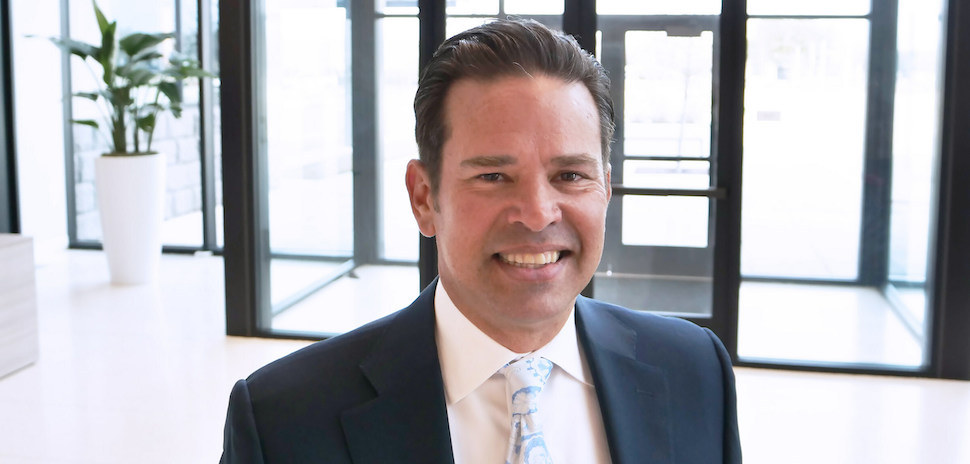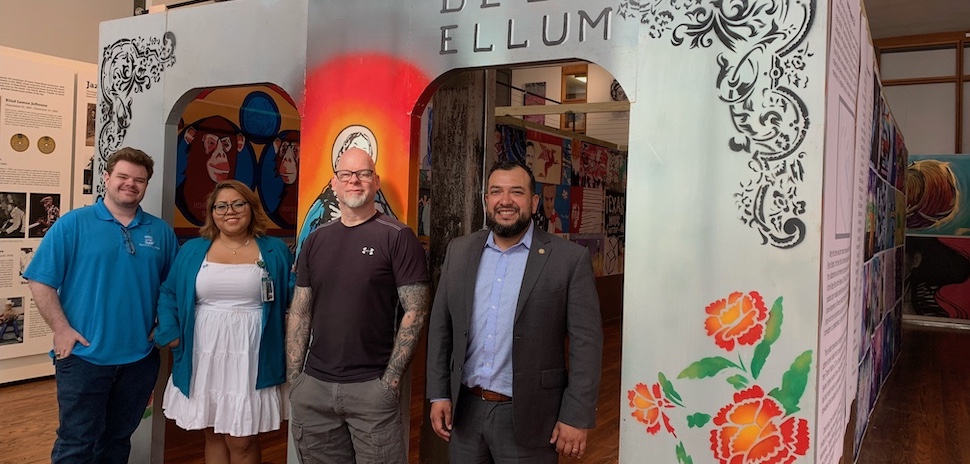Lee Bratcher was featured in Dallas Innovates’ Future 50 in Dallas-Fort Worth in the 2021 edition of our annual magazine. We checked in with the Texas Blockchain Council president on his council’s mission, its recent big wins in the Texas Legislature, and what’s next.
EDUCATION
Blockchain Booster
Lee Bratcher
Bratcher, who teaches political science and directs the master’s program in international studies at Dallas Baptist University, helped launch the Texas Blockchain Council (TBC) in early 2020. After less than 18 months, it’s helped moved Texas forward in big ways.
Bratcher told us earlier this year that the council aimed to make Texas “the jurisdiction of choice for blockchain innovation.” Two big steps to make that a reality happened in the recent Texas Legislative session with the passage of HB 1576 and HB 4474.
“HB 1576 establishes a blockchain working group for the State of Texas for the purpose of producing recommendations to the Legislature and the Governor’s office on ways in which the state should be utilizing and investing in blockchain,” Bratcher explained.
“HB 4474 makes Texas the second state in the country to define, for the purpose of business law, what a virtual currency is and how a security interest in a crypto currency can be perfected. This puts Texas on par with Wyoming as far as friendly jurisdictions for blockchain and cryptocurrency.”
Bratcher and the council worked closely with Representative Tan Parker and Senator Angela Paxton to help guide both bills to Governor Abbott’s desk.
Governor Abbott’s on board

[Image: Maksym Kapliuk/istockphoto]
“Governor Abbott has signed both of these bills into law,” Bratcher noted. “Furthermore, the Texas Department of Banking has issued guidance that Texas chartered banks can custody digital assets. This means that your bank, assuming the proper procedures are followed to confirm to existing regulatory guidance, can custody your Bitcoin, Ether, tokenized real estate, or other digital asset. This is big news for industry.”
Watch out Wyoming?
Bratcher downplays the competition with Wyoming, which beat all other U.S. states in the blockchain- and crypto-friendly game by passing legislation as early as 2018 that cleared up the treatment of digital assets in commercial law. Just this month, Wyoming approved legal status for the American CryptoFed DAO, a decentralized autonomous organization with a mission to introduce a new monetary system. The move makes it easier to promote mass acceptance of digital currencies.
Texas has now become the second state to recognize blockchain and cryptocurrency in its Uniform Commercial Code. Still, it has a long way to go to catch up to Wyoming’s legislative leaps, with more regulatory clarity needed on things like liens placed against digital currencies.
But moving things forward is what the TBC was designed for. And Bratcher knows Texas has some things that Wyoming doesn’t.
“Texas is the second-largest economy in the United States, and our congressional delegation is 10 times the size of Wyoming’s,” Bratcher told crypto news service Cointelegraph. “We have much more influence in D.C. We just want to affirm what Wyoming is doing and come alongside them with a big economy and congressional delegation.”
A critical issue not just for Texas, but for the U.S.
“The U.S. will not retain our economic dominance if we remain on the sidelines in the development of the internet of value,” Bratcher wrote in a recent blog post. “The Texas Blockchain Council exists to make sure that Texas leads the way in prioritizing this new infrastructure for creating, registering, and transmitting value. The size and dynamism of the Texas economy make it an ideal place to host innovative companies working on blockchain and other emerging technology solutions—and the TBC wants to ensure that our state regulatory environment supports that promise.”
Next step: The Texas Blockchain Summit
Bratcher has a big day looming in October.
“We’re planning a large conference in Austin on October 8th,” he said. “The Texas Blockchain Summit will be a blockchain policy and digital assets conference. This conference will highlight Texas as we become the jurisdiction of choice for blockchain innovation.”
Preparing for the summit is taking up most of Bratcher’s time these day, but it hasn’t stopped the council from onboarding new members. He says new members are joining weekly, with the TBC’s membership growing from 20 member companies last year to more than 50 in 2021.
Strategic partners and member companies
The TBC’s strategic partners include Hedera Hashgraph, Hyland, Compass Mining, Whinstone US, Argo Blockchain, Blockcap, Rhodium, and Quinbrook Infrastructure Partners.
Its member partners include Trammell Venture Partners, the Houston Blockchain Alliance, Level III Capital, FTI Consulting, Zabo, Foley and Lardner LLP, Reveille Capital, Crestline Solutions, Dallas Baptist University, Unchained Capital, and many others.
TBC’s core mission
To make Texas the “jurisdiction of choice” in blockchain innovation, the TBC has a number of core goals.
“We exist to amalgamate the influence of our members, to advocate for blockchain-centric public policy initiatives, to educate members of government about the benefits of blockchain technology, and to provide subject matter expertise on topics related to blockchain and distributed ledger technology,” Bratcher said.
“We’re working collaboratively with [our strategic partners and member companies] to achieve our public policy goals and to generate business development partnerships both within the private sector and through public/private partnerships.”
The future of blockchain
“Blockchain and digital ledger technology can transform the way that we transmit value and the way we certify all manner of transactions and interactions,” Bratcher said. “In an interview with McKinsey & Co., Dan Tapscott, the CEO of Tapscott Group, suggested that one could ‘pick any industry, and this technology holds huge potential to disrupt it, creating a more prosperous world where people get to participate in the value that they create.'”
“The Texas Blockchain Council is one of many organizations working to prepare the groundwork for this kind of transformation.”
Motivating members in challenging times
The TBC accomplished big things in the last year despite all the impacts of the COVID-19 pandemic. Now, with the Delta variant causing renewed concern across the U.S., uncertainty is on the rise again. But Bratcher says that won’t stop the TBC’s progress—and the goal of seeing its mission fulfilled in Texas,
“The Texas Blockchain Council is a nimble organization with all of our team members and board of directors working on a volunteer basis,” he said. “Our passion to see this industry succeed and our expectation that this technology will bring about greater human flourishing is how we stay motivated and build resilience.”
Read the magazine
Bratcher was featured in our fourth annual magazine, Dallas Innovates 2021: The Resilience Issue, which highlights Dallas-Fort Worth as a hub for innovation. The collective strength of the innovation ecosystem and intellectual capital in Dallas-Fort Worth is a force to be reckoned with.
![]()
Get on the list.
Dallas Innovates, every day.
Sign up to keep your eye on what’s new and next in Dallas-Fort Worth, every day.




































































